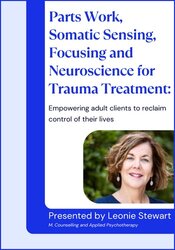

Overcoming wounds from childhood trauma can take decades to heal.
Adult clients who grew up in abusive, controlling, neglectful, insensitive, or otherwise traumatizing environments — are often retriggered by memories from their past...
...making simple moments of the day overwhelming with larger-than-life responses due to their inability to regulate emotions.
But there’s good news...
We now have a way to fast-track clients' progress by giving them specific tools and strategies to take back the control of their life.
Using targeted techniques from parts work and focusing, you can go directly to their wounded parts and begin to heal them.
For one day only, you can join Leonie Stewart, M. counselling and Applied Psychotherapy, as she shows you step by step how to blend Parts Work with Somatic Sensing, Focusing and Neuroscience to deepen your therapeutic progress.
Her simplified techniques are easy to implement and make Parts Work approachable for clients and clinicians alike.
You’ll walk away from this one-day workshop with a simple but powerful process to help your clients be with the dysregulated, distressed parts of themselves today... So they have the power to shape their future for the better.
PESI Australia, in collaboration with PESI in the USA, offers quality online continuing professional development events from the leaders in the field at a standard recognized by professional associations including psychology, social work, occupational therapy, alcohol and drug professionals, counselling and psychotherapy. On completion of the training, a Professional Development Certificate is issued after the individual has answered and submitted a quiz and course evaluation. This program is worth 7 hours CPD for points calculation by your association.
| File type | File name | Number of pages | |
|---|---|---|---|
| Parts work_Leonie Stewart_ Training Manual (29.3 MB) | Available after Purchase | ||
| E-book MtM pdf What-is-Stress (774.1 KB) | Available after Purchase | ||
| E-book MtM pdf What-is-Mindfulness-and-Meditation-E-book (430.5 KB) | Available after Purchase | ||
| E-book doc What is Focusing (633.7 KB) | Available after Purchase | ||
| E-book MtM pdf What-is-Wellbeing1 (1014.7 KB) | Available after Purchase | ||
| E-book-More-Ways-To-Be-Mindful (2.2 MB) | Available after Purchase |

Based in Sydney Leonie Stewart provides counselling, coaching & focusing sessions. She enjoys working with individuals, couples and also with young people. Leonie believes we are all meant to belong and connect, to love ourselves and to love others.
Leonie's qualifications include a Masters in Counselling and Applied Psychotherapy, Graduate Diploma in Emotionally Focused Therapy, Qualified Focusing Orientated therapist and trainer, Accredited Relational Life Therapy Therapist, Qualified Meditation and Mindfulness teacher, and a Bachelor of Physical Education.
She is a clinical member of Psychotherapy and Counselling Federation of Australia (PACFA).
Speaker Disclosures:
Laying the Groundwork: Parts Work, Somatic Sensing, Focusing and Neuroscience for Trauma Treatment
Exploring and conceptualizing the ‘Big Self/Wise Adult Self’
Guiding clients to ‘unfold’ this part of themselves
Using Somatic Sensing
Helpful tips around the concept
Present time awareness: Safety exercise to use with clients (or self)
Parts theory
Foundations for clinical practice
Demonstration & guided practice: the ‘Big Self/Wise Adult Self’
How to settle any part that is activated
Demonstration & guided practice: Unfolding your ‘Big Self/Wise Adult Self’
Introduction to Focusing
Interactive demonstration on Focusing
Understanding “Felt Sense”
Gendlin’s Philosophy
6 step Focusing process
Tools for helping clients interact with their environments
Cultivating Self-compassion
Demonstration & guided practice: Cultivating Self-compassion
Demonstration & guided practice: Clearing a space – what to do when overwhelmed
Demonstration & guided practice: Getting bigger than what is bothering you
Demonstration & guided practice: Protective Boundary
Loving Kindness meditation
L.O.V.E. for me and others activity
Bringing it all together
How we change
Memory reconsolidation + Focusing
Techniques to settle any triggered parts
Simple neuroscience language to talk about the brain and body
Handouts you will receive
Parts theory description handout
Worksheet for unfolding your Wise Adult
What is Focusing? E-book
Questions you can ask your parts - handout
Clearing a space – guiding notes
Cultivating Compassion – guiding notes
Getting bigger than what is bothering you Guiding notes
What is STRESS – e-book
What is Mindfulness – e-book
Please wait ...